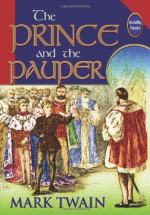
|
| Name: _________________________ | Period: ___________________ |
This test consists of 5 short answer questions, 10 short essay questions, and 1 (of 3) essay topics.
Short Answer Questions
1. What does Tom dream about and incorporate in his play time?
2. Where does Miles think Edward may be heading?
3. To what does Tom resign himself for dinner?
4. How does Tom feel about Lady Jane and Lady Elizabeth?
5. What does Jane Grey's visit to Edward's room accomplish?
Short Essay Questions
1. What does the prince's presentation to the people look like?
2. Where is Miles looking for Edward? What does he think Edward might have done?
3. Whom is Tom told to see after Lady Jane leaves? What is the result of that meeting?
4. What happens when Lady Jane Grey visits Tom as the prince?
5. What is Tom's house like? Who lives there with him?
6. What does Hertford tell the king in response to the king's problem in question # 16? What does Hertford do? What is the result of Hertford's action? What does the king decide to do?
7. Where does Edward take Tom after he is ruffed up by the palace guards? What does Edward tell Tom about his family?
8. What is Tom doing when the prince first does not return?
9. What does Edward see when he wakes in the barn and what do the people talk about?
10. What does Tom do on the first day in which they believe he is the king?
Essay Topics
Write an essay for ONE of the following topics:
Essay Topic 1
The jewels in which Tom is draped are blinding in the light. Symbolically, they blind others to the boy as a false prince.
Discuss one of the following:
1. Thoroughly analyze how the setting informs the plot in The Prince and the Pauper.
2. Trace and analyze one major theme of The Prince and the Pauper. How is the theme represented by symbolism? By the characters' behaviors? By the action?
3. Trace and analyze two secondary themes of The Prince and the Pauper. How are the themes represented by symbolism? By the characters' behaviors? By the action?
Essay Topic 2
Choose one of the following to discuss:
1. Choose two significant symbols and trace and analyze their appearance in The Prince and the Pauper. Are these universal symbols? Would they be understood in any culture? Are there other symbols that would portray the same idea? What are they? Why do you think Twain chooses the symbols he does?
2. Choose two important metaphors and trace and analyze their appearance in the novel. Are these universal metaphors? Would they be understood in any culture? Are there other metaphors that would portray the same idea? What are they? Why do you think Twain chooses the metaphors he does?
3. Discuss Twain's use (or lack ) of literary device (such as foreshadowing, cliff hangers, deux ex machina, etc...), and how they add or detract from the story. Does Twain use too many or too little literary techniques? State which of the five major elements of fiction the literary device is related to (style, character, plot, setting, theme).
Essay Topic 3
Tom's charmed existence continues, while Edward's troubles only deepen, until he finally gets help from Miles Hendon. Just as this brave soldier rescues the boy, Tom reacts to news of the king's death by issuing a command to rescue the Duke of Norfolk from execution. Again, the contrast between Edward's helplessness and Tom's power is forcefully made.
1. Discuss the above statement in terms of power. Use examples from The Prince and the Pauper to support your ideas.
2. Discuss the ways in which Edward and Tom can both adapt to the huge changes in their lives. Use examples from The Prince and the Pauper to support your ideas.
3. Overall, how believable is the plot of this book? Discuss why it could seem real and why it seems completely unbelievable. For example, when the guards first pushed Edward out the gate, is it believable that palace guards wouldn't recognize their prince even dressed in rags? Use examples from The Prince and the Pauper to support your ideas.
|
This section contains 1,257 words (approx. 5 pages at 300 words per page) |

|




